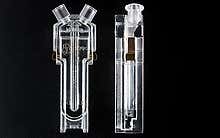Présentation générale
Ideally, for zeta potential measurements, a long linear capillary cell is used to separate the measurement zone from the vicinity of the electrodes, and provide a long enough surface for a smooth electro osmotic profile to develop. Also, a narrow capillary restricts the current for a given applied voltage, to reduce Joule heating. These features increase measurement accuracy and repeatability.
The disposable folded capillary cell has the advantages of a linear capillary cell, as well as the convenience of being a disposable ‘plug and play’ cuvette.
- Totalement jetable, y compris les électrodes
- Utilisable pour réaliser des centaines de mesures sur des échantillons à conductivité
- Compatible avec la méthode de la barrière de diffusion pour améliorer les mesures de mobilité des protéines
- Éliminez la contamination croisée en changeant de cellule
- Conçue principalement pour la mesure du potentiel zêta, mais également appropriée aux mesures granulométriques
Fonctionnement
The folded capillary cell is molded from polycarbonate, with gold plated electrodes with a springy beryllium-copper base.
When the cell is inserted into the instrument the electrodes connect with solid gold contacts in the cell area.
Use of polycarbonate means that cell is designed for use with aqueous dispersants and buffers.
The cell is filled via standard Luer fittings which are compatible with the disposable and glass syringes with Luer fittings.
After filling, the cell is sealed using plugs provided with each cell.
As the sample can be left in the cell, it can be reinserted for re-measurement at any time.
Although the cell is primarily designed for the measurement of zeta potential, the sample size can also be measured in the cell. It can be useful to measure the size before and after a zeta potential measurement to show that the measurement has not affected the sample by causing aggregation.
This is typically a problem when measuring the zeta potential of molecules such as proteins, where contact with the electrodes can cause denaturing.
The folded capillary cell is compatible with the ‘diffusion barrier’ measurement method (patent applied for), that separates the sample from the electrodes. This is done by filling the cell with buffer, then introducing a small volume of sample into the measurement zone.
Spécifications
| Compatibilité du système | Zetasizer Nano ZSP, ZS, Z, ZS90. |
|---|---|
| Sample compatibility | Échantillons aqueux. |
| Volume d'échantillon | 0,75mL. |
| Operating temperature (°C) | 0 °C à 70°C. |
| Includes | Folded capillary cell, two stoppers for each cell. |
| Matériaux | Polycarbonate cell, gold plated Beryllium Copper electrodes. |

